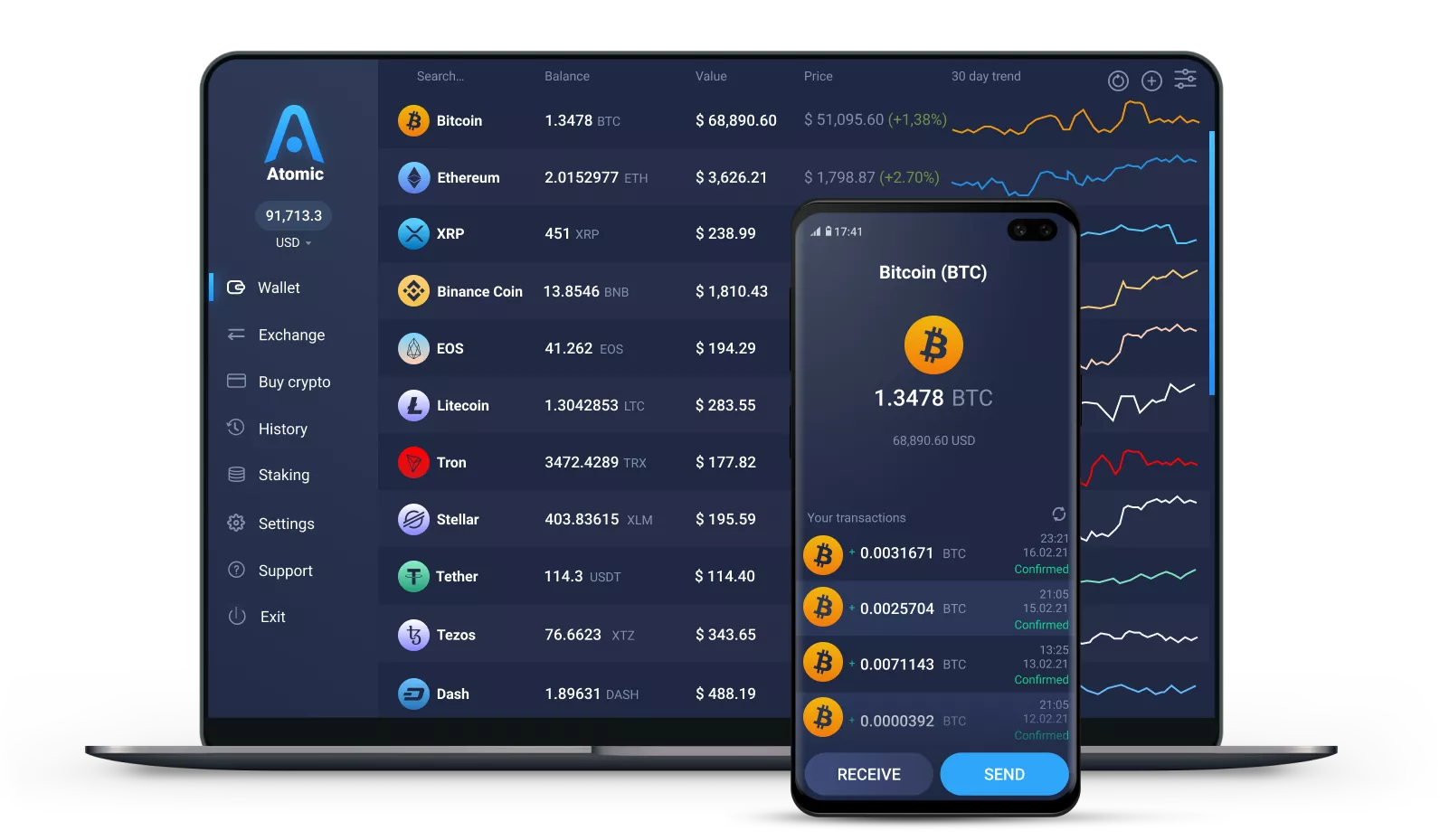Trusted Reviews
Why Choose Atomic Bitcoin wallet
A Bitcoin Wallet: Safekeeping Your Future
As inflation hits, many look to gold as the infamous hedge. That's evolving as cryptocurrencies evolve and gain popularity, especially Bitcoin. Bitcoin is becoming less volatile and more established, leading some countries, like El Salvador, to adopt it as a second official currency or even an inflation hedge. Countries are turning to crypto as they adjust quantitative easing efforts to salvage the fiat currency model.
Bitcoin, unlike fiat, is a finite token system that can work as a currency or store of value. Many investors are diversifying their portfolios by including Bitcoin to hedge the risk associated with fiat and money printing. You'll need a Bitcoin Wallet to store and transact your Bitcoin holdings.
We produced this helpful guide to teach you everything you need about getting a Bitcoin Wallet app and storing your digital gold. You'll also benefit from a detailed guide on a specific wallet, Atomic Wallet, which offers useful features like sending and receiving, staking, and exchange.
Let's start by learning more about the first-ever cryptocurrency, Bitcoin.
What Is Bitcoin?
Bitcoin is the first-ever cryptocurrency created in 2009 by Satoshi Nakamoto. Cryptocurrency gets its name from the cryptographic equations miners solve before validating a block of transactions. It's a digital currency that works on peer to peer Bitcoin network.
Bitcoin is built on blockchain technology, and the digital money is secured through cryptographic hashing over a distributed decentralized network. Each transaction block is distributed over multiple wallet addresses as account numbers. Bitcoin's primary and only function is to be a store of value that users with Bitcoin wallets can send and receive. Other digital assets, like Ethereum, can execute smart contracts.
Bitcoin is the first digital currency that operates on blockchain technology. A blockchain is a series of blocks containing all the transactions that occurred in the past 10 minutes. New blocks are generated every 10 minutes.
Before creating a new block, the current block must be verified. It can never be overwritten once verified and all the transactions in that block are confirmed. This immutable distributed ledger is a transparent list of transactions anyone can explore. The transactions don't display any usernames, only wallet addresses.
How does a wallet work, and what differs from a bank account?
How Do Bitcoin Wallets Work?
A Bitcoin wallet is a software program that generates an address, stores tokens, and allows you to send and receive Bitcoin. Simple, right? Well, that's the concept's bare bones. In reality, though, wallets have much, much more to them.
A crypto wallet is an app to store your crypto portfolio. First, Bitcoin wallets don't support other crypto assets. It also doesn't have staking options or exchanges to buy, sell, and trade Bitcoin.
Unlike the basic Bitcoin wallet, Atomic Wallet encompasses all the above features: users can buy, exchange, and manage Bitcoin conveniently.
Though not all wallets are the same, you have dozens of Bitcoin wallet apps out there to choose from. Some wallets are basic, just for storing, sending, and receiving, while Atomic offers a built-in exchange, staking, cashback payments, and other options. You should choose a wallet to suit your needs.
Another fun fact: you can have more than one wallet! You have more than one physical wallet at home, right? You can do the same with cryptocurrency wallets, too. Decentralized crypto apps like Atomic allow you to store all your wallets in one place. Hardware wallet support also helps many users to protect their assets with another layer of security features.
Now that you have your Bitcoin wallet, you may have many questions about it. Let's get technical here and try to answer some questions.
First, let's look at Atomic Wallet account and how to get started with it.
Atomic Bitcoin Wallet Features
Atomic Wallet has many features, and we'll discuss 4 of the main features and how to use them next.
1. What Is a Bitcoin Wallet Address?
It's like your mailing address; you give it to anyone who wants to send you some Bitcoin! The most pressing question you can ask is: where's my address, and how do I use it? After downloading the app for your PC, iOS, or Android device, you'll find it on Atomic Wallet's main screen.
- Go to Bitcoin and open it.
- Find send and receive at the bottom
- Click on receive, and you'll see your wallet's address
A wallet address is usually between 27 and 34 alphanumeric characters. Bitcoin addresses begin with only three alphanumeric characters 1, 3, or bc1. An example of a Bitcoin address is: 1BvBMZAUstWetqTFn5Au8m4GFh7xJaNPM2
Unlike regular mailboxes, you won't get a call that your mail reached another person by mistake. Always ensure you're sending your Bitcoins to a Bitcoin address, or else it could be lost forever without any way to get it back. This applies to all cryptocurrencies, not just Bitcoin.
We can't emphasize this enough, always double-check your addresses!
2. Bitcoin Seed Phrases
When you create a wallet, you need to create a seed phrase. It usually consists of 12 random words in a particular order. Write it down and save it somewhere safe. This is your only opportunity to set up your passphrase. We'll get to passphrases next, but hold on to your seed phrase for now.
This phrase allows you to access your wallet if you get locked out or get a new phone and you need to re-download your wallet. You also need it to reactivate your wallet on your new phone. Still, you should delete your wallet from your old phone and wipe the data off once it's all migrated to your new device.
If you're using a wallet on a desktop computer, migrate it to a new machine before throwing out the old one. Otherwise, you might spend the rest of your life sifting through a landfill to find it. We're not joking! That's a true story you can read more about here. But don't worry: While keeping the mnemonic seed phase in a safe place, you can sign in to your crypto wallet anytime in any place.
3. Bitcoin Passphrases
You should have a seed phrase to restore your wallet on another PC or mobile device. Moreover, you should also secure your wallet with a custom password. That's just another level of security to protect your favorite cryptos. You wouldn't just leave your cash lying about your house and don't do it with crypto. You'll want to keep it as secure as possible.
A passphrase is like two-factor authentication, but the questions are about things you know, not something you are/have. Many traditional security questions ask things like: what street did you grow up on, what was your mother's maiden name, what was your first pet's name, etc. Typically, only you could answer these questions. Still, anyone cunning enough could discover this information and learn how to steal your wallet.
4. Private Keys and Public Keys
You've probably heard the terms private and public keys when discussing encryption. What are they, though? A private key is just that: your wallet's key. Your Bitcoin wallet must have a private key to generate a public key. Essentially, the private key identifies your wallet on the network. You must also store it in a safe place like your seed phrase. Learn how to store it properly in our blog post.
The public key is a hashed version of your private key. That way, it can only be decrypted one way, not decrypted in reverse. In other words, if you send Bitcoin to an address (public key), it can only be decrypted one time, in one direction. That's why we say make sure you're sending it to the correct address!
The public key is decrypted to show the private key and send funds to the correct address. This one-way encryption is hashing, the most prevalent form of encryption in cryptocurrency.
You must pay the fee to get your Bitcoin from one wallet to another.
Bitcoin Miner Fees
Miner fees are dynamic and always make the news because they're so high. They're not always so high, but Bitcoin has gone through several periods where network congestion made miners' fees very high. In other words, if many transactions are happening in the system, the miners' fees would likely be very high due to the congestion. That's comparable to Uber rates during rush hour.
To put things into perspective, in April and May 2021, many transactions were happening on the market, making fees as high as $50. They were also very high back at the end of 2017 when Bitcoin hit a price record shy of $20,000.
Imagine you want to send a friend $20 worth of Bitcoin, but the fee alone costs $50. Transaction fees like that would make you not want to use it, except for larger transactions. People began to jump on the Bitcoin bandwagon when its price skyrocketed. All that activity led to high miners' fees, which caused a lot of complaints. Now, fees are generally much lower.
The number of inputs on a transaction could also cause higher fees. If you send some Bitcoin and it's broken up into smaller pieces, these smaller pieces add more memory to the transaction. That means they'll be processed with a larger memory size, and the miners' fees will increase as they incur a higher cost.
Let's address the elephant in the room. Why do fees exist, to begin with?
These fees give incentives to the miners to verify the blocks. Miners verify each block using mining machines that crunch the numbers on the cryptographic puzzles. When the miners complete a block, they receive some Bitcoin as a reward.
Regarding rewards, miners can prioritize which transactions they include in a block. The higher the miner fee, the higher the chances the miner will include it in the current block. In some cases, if your transaction carries a lower fee, it might take a few blocks until a miner picks up your transaction, puts it into a block, and verifies it. That way, the mining system is incentivized for the miners, too.
Bitcoin blockchain can only progress with the miners who complete transactions. That's why the miners and their fees are critical to the Bitcoin ecosystem.
Another important thing to mention is how to pay the miners' fees. Don't worry: most wallets will include that in your transaction. They'll deduct the miners' fees from the amount you're sending.
What Can You Do with Bitcoin?
You can use crypto for trading, buying things, paying people, sending and receiving Bitcoin worldwide, and doing what most people do, invest and save. Bitcoin is an excellent store of value because it gains so much value over a short time. Since it appreciates so quickly, it's a great hedge against inflation, which the world is seeing a lot of now. Bitcoin is dubbed digital gold, which is crazy when you think about it! It's even more than digital gold because it's worth so much!
Some countries are embracing Bitcoin to save their economy. El Salvador got an idea to make Bitcoin an official currency alongside their national currency. In Turkey, people also are adopting Bitcoin after inflation and a plummeting Lira destroyed purchasing power.
Bitcoin Resources
Atomic Wallet
Check the latest wallets and digital assets on Atomic Wallet on our website. Install Atomic on a PC or mobile device with just one click. The app allows you to store millions of cryptocurrencies with full control. In addition, you can buy, swap crypto and earn interest with 20+ assets.
Atomic Wallet Academy
Learn about cryptocurrencies and Bitcoin in our Academy.
Bitcoin Blockchain Explorer
Check out transactions and the status of Bitcoin and other cryptocurrencies on Atomic Wallet's Blockchain Explorer.
Bitcoin website and source code
Get more info about Bitcoin from the official site.




















